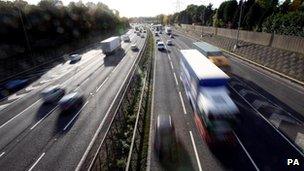Drug-driving law set to be introduced in Queen's Speech
- Published
- comments

The government believes the law change will make it easier for police to prosecute drug-drivers
Drug-driving in England, Scotland and Wales could become a specific offence with a jail term and fine, under a new law expected in the Queen's Speech.
Police have to show driving has been impaired by drugs to prosecute.
But under the plans, drivers could face up to six months in jail for driving with certain controlled drugs in your body in excess of specified limits.
Road Safety Minister Mike Penning said legislation would give police powers to "remove this blight".
In the future, police will be equipped with handheld detection devices to test saliva at the roadside.
Offenders could face a fine of up to £5,000, a driving ban of at least 12 months as well as a prison term.
Mr Penning told BBC Breakfast it had taken so long to bring in such a law because testing had always been seen as "very complicated".
He said in Germany, Spain and Australia this was already being done.
"What we are saying is drug-driving is blighting this country and people are being killed and seriously injured on a regular basis.
"We don't know exactly how many because we're not testing correctly so bring the technology through, give the police the powers and remove this blight."
He said five different roadside saliva-testing devices were being considered at the Home Office which is expected to give approval by the end of the year.
Gary and Natasha Groves on their campaign against drug driving after their daughter was killed
A scientific review panel is also looking at what drugs the devices would test for.
That panel has been considering a scientific case for a new offence and looking at the effect of individual drugs, such as cocaine and cannabis on driving.
The exact drugs covered by the offence and the specified limits for each will be decided following advice from the panel and public consultation.
"You'll be tested for drink first because, that's the natural assumption, that if a policeman thinks you're impaired, he'll test you for drink," said Mr Penning.
"If you pass that and he still thinks you're impaired, he's actually going to take a saliva swab from you at the side of the road so we're going to replicate what happens with drink for all the legislation going all the way through."
Roadside tests would give police the powers to arrest people for drug-driving.
"Then we're going to have a new piece of equipment in the station which will do exactly the same as what the drink testing does which will actually give the prosecution the evidential test to take you to court."
Gary Groves, whose 14-year-old daughter Lillian Groves was killed outside her home in Croydon, south London, by a driver who admitted taking drugs before the accident, said the legislation was "very important".
"It's important, not just for us, but for other families to come," he told Breakfast.
"Hopefully we can get this through - we're trying to push for zero tolerance but we'll just keep pushing and pushing."
Lillian's mother Natasha Groves said other parents had come forward.
"You think you are on your own but obviously there is a far wider problem, it is not just not us out there on our own. It happens all the time."
'Not acceptable'
Joanna Bailey, from road safety charity Brake, told BBC News: "Drink-driving's not acceptable, it's not acceptable to drug-drive either."
The law is to be included in the Crime, Communications and Court Bill.
Prime Minister David Cameron said they wanted to get "drugalysers rolled out more quickly".
Mr Cameron, who met the Groves family last year, said: "As they said at the time, it simply can't be right that a schoolgirl like Lillian can lose her life and then we discover we don't have the laws or the technology to punish drug-drivers properly.
"I hope now that something good can come out of their tragic loss."
The proposed law affects motorists in England, Scotland and Wales.
Northern Ireland's Department of the Environment said it was working towards creating an offence of driving with a "named substance in your body".
A spokeswoman said it was currently illegal to drive in Northern Ireland whilst impaired through drink or drugs.
- Published6 August 2010
- Published4 January 2012
- Published10 February 2012